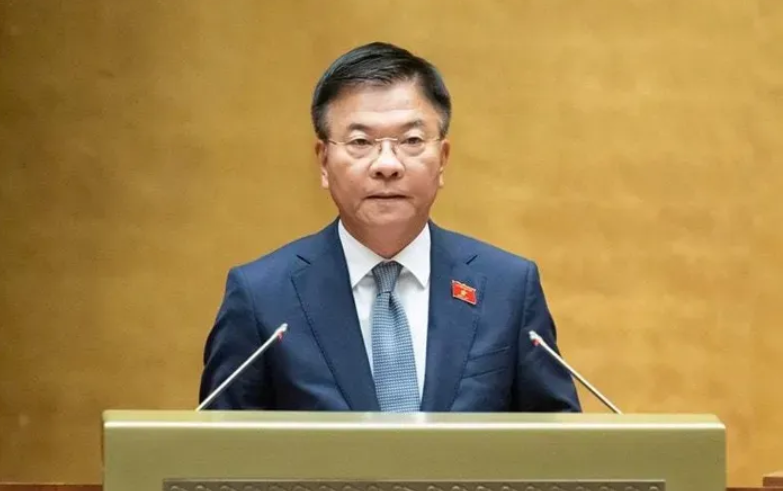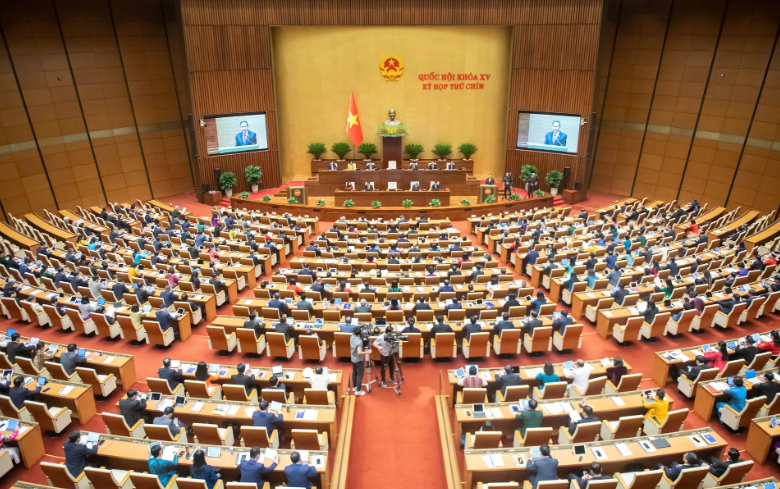Vietnam prioritizes development of strategic nuclear technology
The government will continue to encourage domestic and international participation in the nuclear field.
THE HANOI TIMES — The Vietnamese Government on May 5 submitted a draft amendment of the Atomic Energy Law to the National Assembly, proposing that national resources be prioritized for the development of strategic nuclear technology.

Deputy Prime Minister Le Thanh Long at the NA session. Photos: quochoi.vn
The draft amendments would favor targeted investments and encourage the participation of domestic and foreign organizations and individuals, as well as international institutions in the field of nuclear energy to support socio-economic development.
They encourage scientific research and technology development programs, with resources prioritized for strategic nuclear technologies. Entities working in this field will be eligible for incentives regulated by the government.
The draft amendments are expected to facilitate the involvement of the private sector and encourage the establishment of research and application facilities for nuclear and radiation energy. It will also focus on investment through public-private partnerships and access to loans for radiation and nuclear infrastructure and equipment.
Vietnamese organizations and individuals may cooperate with international nuclear energy organizations to establish joint laboratories; lease, sublease, or use assets for business purposes, joint ventures, or partnerships; and receive funding or assistance from domestic and foreign entities.
Addressing the National Assembly yesterday, Deputy Prime Minister Le Thanh Long stressed the need to revise the law after 17 years of implementation, citing shortcomings and rapid advances in nuclear science and technology.
"The draft amendments promote the peaceful use of nuclear energy to achieve socio-economic development goals and strengthen national security and defense," Long said.
These provisions are in line with Politburo Resolution 55/2020 on Vietnam's National Energy Development Strategy to 2030 with a Vision to 2045. The resolution calls for the effective use of trained nuclear personnel, further capacity building, and rapid implementation of international commitments on the peaceful use of nuclear energy.

The 9th session of the National Assembly.
Le Quang Huy, Chairman of the National Assembly Committee on Science, Technology and Environment, supported the strategic focus on nuclear energy. However, he stressed the need to improve the quality of domestic human resources in order to achieve full autonomy in nuclear energy and to enhance extraction of radioactive minerals.
The committee also recommended that provisions be included in the draft law to promote the application of advanced science and technology in the processing of radioactive minerals, with a view to achieving self-sufficiency in raw materials and expanding export opportunities. In addition, it's necessary to make policies that encourage international cooperation in nuclear energy.
The committee urged the government to invest in developing research institutes and universities into strong research centers and foster close integration between basic and applied research and education to help Vietnam gradually master and localize nuclear energy technology and equipment.
In addition to strategic nuclear technologies, the draft law focuses on key policy areas such as radiation protection, nuclear safety and security, decentralization of state administration, and facilitation of nuclear inspections. It provides clear regulations for the management of radioactive waste, spent fuel and radiation sources, improves preparedness for radiation and nuclear incidents, and ensures civil liability for potential damage.
Vietnam established its legal foundation for the peaceful use of nuclear energy through the 2008 Atomic Energy Law. Building on this, Resolution 55/2020 reaffirmed the importance of nuclear energy development, emphasizing the effective use of trained personnel and the full implementation of international commitments in the sector.
To date, atomic energy has been applied in various sectors in Vietnam, including medicine (diagnosis and cancer treatment), agriculture (breeding, preservation), industry (inspection, environmental treatment), and research (Da Lat nuclear reactor).











